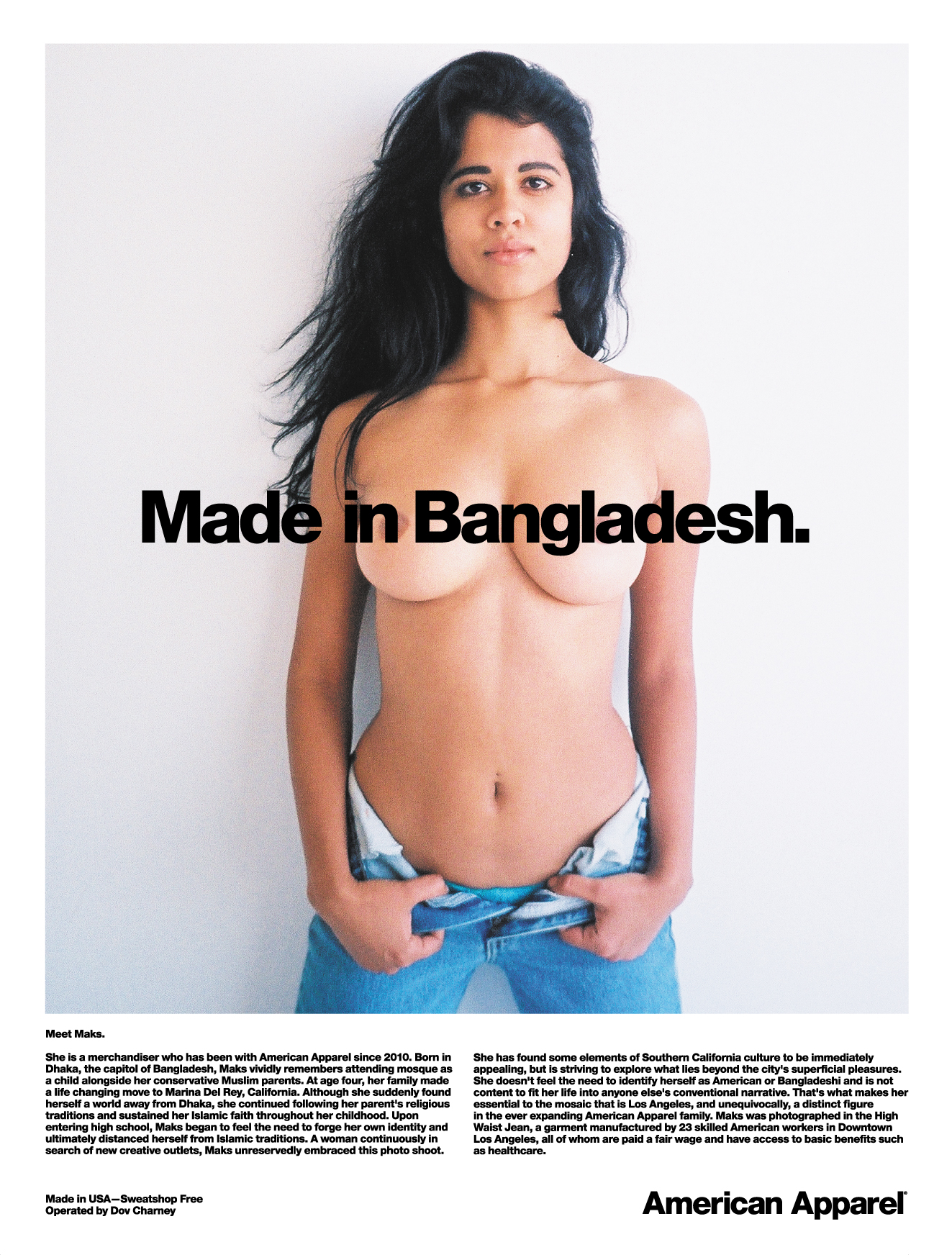Adult only.
‘MADE IN BANGLADESH’
American Apparel, as per usual, 1) strikes at the heart of bullshit corporate America with its ethics (in this case an anti-Sweatshop ad) while 2) promoting inspiring ideals such as religious freedom, pro-feminist ideals from a personal perspective…and then 3) going in for shameless, stylish self-exploitation, 4) pissing off half of its own demographic…and in so doing 5) garnering a million dollars of free publicity.  Read the text, above. Or, here:
Read the text, above. Or, here:
“[Maks] is a merchandiser who has been with American Apparel since 2010. Born in Dhaka, the capitol of Bangladesh, Maks vividly remembers attending mosque as a child alongside her conservative Muslim parents. At age four, her family made a life changing move to Marina Del Rey, California. Although she suddenly found herself a world away from Dhaka, she continued following her parent’s religious traditions and sustained her Islamic faith throughout her childhood. Upon entering high school, Maks began to feel the need to forge her own identity and ultimately distanced herself from Islamic traditions. A woman continuously in search of new creative outlets, Maks unreservedly embraced this photo shoot. She has found some elements of Southern California culture to be immediately appealing, but is striving to explore what lies beyond the city’s superficial pleasures. She doesn’t feel the need to identify herself as an American or a Bengali and is not content to fit her life into anyone else’s conventional narrative. That’s what makes her essential to the mosaic that is Los Angeles, and unequivocally, a distinct figure in the ever expanding American Apparel family. Maks was photographed in the High Waist Jean, a garment manufactured by 23 skilled American workers in Downtown Los Angeles, all of whom are paid a fair wage and have access to basic benefits such as healthcare.”
This is a complicated ad from a…complicated…company that, in typical fashion, both raises vital ethical questions that other companies are too cowardly to ask, and raises religious tolerance and pro-feminist issues…and then pisses off half of its own target demographic, both helping to get AA a ton of free publicity. Win, lose, it’s a win! From the Daily Beast:
Sure, the statement may be a playful nod at the model’s heritage, but it also targets one of the fast-fashion industry’s biggest issues: sweatshops and their unsafe working conditions. In April 2013, Bangladesh-based garment factories made international headlines when the Rana Plaza Building, which produced clothing for the likes of JC Penney and Mango, collapsed, causing over 1,000 deaths. Following the tragedy, American Apparel CEO Dov Charneyspoke out against overseas, sweatshop production. “In Bangladesh, the problem with these factories is that they’re only given contracts on a seasonal or order-by-order basis,” Charney told the L.A. Times. “There’s so much pressure to perform, some of the working conditions are outrageous, almost unbelievable. It has completely stripped the human element from the brands… It’s such a blind, desensitized way of making clothing.” In 2002 American Apparel dubbed itself “sweatshop-free”…
Bonus: “The Real Made in Bangladesh.”
“…a response to the the American Apparel advertisement that has stirred controversy in the Bangladeshi community. The cover features Sadaf Siddiqi, representing a positive message about what “Made in Bangladesh” can mean. Sadaf, a Bangladeshi raised in the United Kingdom, is the chairperson of SAFE, an organisation that provides emergency disaster relief, which was actively enaged in rescue efforts after Rana Plaza collapsed. She promotes Bangladeshi culture through her involvement in music, dance, and literature. She also works in the garment industry…”
For more:
Why Does American-Made Clothing Cost More?
We’ve covered why I love AA in the past, and we’ve covered its founder’s problems, too. Relephant Reads:
The Cold Hard Truth About the Fashion Industry.
Performance Art Highlights Poor Garment Working Conditions in Cambodia {Video}












Read 11 comments and reply